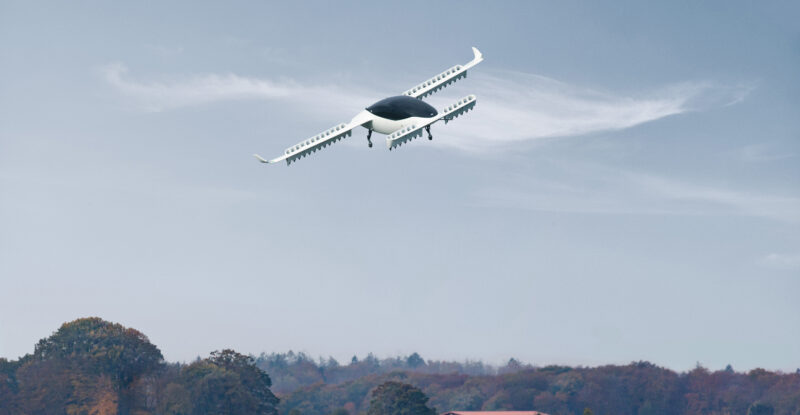 Though some skepticism still exists about the prospect that electric vertical take-off and landing (eVTOL) vehicles will revolutionize short-haul commercial air transport, one can’t deny that clear advancements are being made to support development of these small green aircraft. And there is now reason to hope that the naysayers will be proven wrong.
Though some skepticism still exists about the prospect that electric vertical take-off and landing (eVTOL) vehicles will revolutionize short-haul commercial air transport, one can’t deny that clear advancements are being made to support development of these small green aircraft. And there is now reason to hope that the naysayers will be proven wrong.
For instance, German aerospace company Lilium N.V. is gearing up to unveil a full-scale model of its Lilium Jet eVTOL later this month at the European Business Aviation Convention & Exhibition (EBACE) in Geneva. The company received Design Organization Approval from the European Union Aviation Safety Agency (EASA) late last year, and says its first piloted Lilium Jet flight is targeted for the end of 2024. Diehl Aviation is collaborating on the design and development of the cabin, as well as acting as the integrator and manufacturer for interior components.
Eve Air Mobility, the Brazilian subsidiary of Embraer, is meanwhile going great guns to assemble its first eVTOL prototype. It says it’s on schedule to complete production and is eyeing entry-into-service in 2026. Recaro Aircraft Seating has already been selected to design, certify, and produce seats for the Eve eVTOL, and is set to deliver a total of 75,000 seats, organized in shipsets of five seats each, with deliveries commencing in the first quarter of 2025.
And during the first quarter of 2024, Santa Cruz, California-based Joby Aviation became the first electric air taxi company to have its final airworthiness criteria published by the US FAA. Additionally, it produced its second production prototype aircraft, with two further aircraft now in final assembly. Joby also broke ground on an expanded production facility in Marina, California, and acquired an existing facility in Dayton, Ohio to support initial scaled manufacturing operations.
It won’t surprise you to learn, then, that key suppliers to these firms are ramping up deliverables.
One such company, Itzehoe, Germany-based lithium-ion battery cell innovator CustomCells, has, in fact, begun the process of application with EASA for achieving Design Organization and Production Organization certifications.
“This landmark initiative underscores CustomCells’ commitment to advancing the electrification of aviation and setting new standards for airworthy battery solutions,” it says in a statement.
“By meeting EASA’s stringent standards,” it adds, “CustomCells aims to provide the aviation industry with battery cells that offer unmatched reliability, performance, and safety. As we embark on this certification process, CustomCells is committed to transparency and collaboration with regulatory bodies, industry partners, and stakeholders.”
Runway Girl Network reached out to CustomCells to learn more. The firm confirms that it is actively delivering battery technology to partner Lilium, with a spokesperson saying: “The program has shifted from the original development and industrialization of the technology and is now focused on production to support Lilium’s first flights this year.”
CustomCells is also supporting Munich-based Vaeridion GmbH’s Microliner electrical conventional take-off and landing (eCTOL) aircraft, which could be delivered before 2030. Notably, Vaeridion has already started an extensive functional test campaign of its Electric Propulsion Unit (EPU) demonstrator.
“CustomCells is actively working with Vaeridion as they develop their electric Microliner program,” says CustomCells’ spokesperson when asked if it’s tracking towards meeting Vaeridion’s goal of market launch before the end of this decade. The Microliner will transport nine passengers up to a range of 500km.
The Lilium Jet and Vaeridion programs differ in a few ways, confides CustomCells.
First, the level of maturity of the two programs is different with Lilium being further through their planned timeline with the subsequent increased complexity involved in being closer to flight.
Second, the two flying applications are very different with Lilium focused on an electric Vertical Take Off and Landing product and Vaeridion focused on a electric Conventional Take Off and Landing product. Thus, the cell requirements of the these two flying applications are very different and require batteries of different design, construction and performance; however, both are required to meet the stringent requirements for airworthiness.
Joby, meanwhile, counts Toyota Motor Corporation as a key partner, having in 2023 tapped it to supply powertrain and actuation components for its eVTOL. Toyota also played a role in the design of the Joby pilot production line and is a strategic partner and investor. There is strong continued momentum behind the Joby project.
Toyota Ventures, the Japanese manufacturer’s early-stage venture capital arm, recently announced two $150 million funds to expand its investments in startups developing disruptive technologies at the forefront of innovation, bringing the firm’s total assets under management to over $800 million. Though it hasn’t explicitly stated where the funds will be directed, Toyota Ventures founder and general partner Jim Adler notes in a LinkedIn post that:
“We’ve tested this founder-first philosophy across more than 75 startup investments. With Joby Aviation, our initial investment in 2017 was followed by the creation of Toyota’s Flying Mobility team, additional Joby capital from Toyota Motor Corporation, and manufacturing collaboration between Joby and Toyota.”
For its part, Joby is celebrating the breaking of ground to support its Marina expansion, which in time will more than double Joby’s manufacturing footprint at the Marina Municipal Airport. The facility, which is expected to begin operations next year, “will play a foundational role in our future success and it is a privilege to once again be growing our footprint and our workforce in California”, says Joby founder and CEO JoeBen Bevirt in a statement.
“I am grateful to the local community and our many supporters who have advocated on our behalf to reach this point and to Toyota for everything they continue to do to make manufacturing a success at Joby,” he adds.
Related Articles:
- Diehl Aviation sees eVTOLs as part of green intermodal solution
- Lilium sees premium service entry for Lilium Jet eVTOL
- Norway’s Elfly unveils amphibious electric flying boat configuration
- Dubai sightseeing seen as perfect introduction for eVTOL service
- SITA on becoming the preferred digital provider of VoloCity vertiports
- Dynamic duo Eve and United work to define UAM ecosystem
- Joby agrees early eVTOL introduction with Delta
Featured image credited to Lilium













